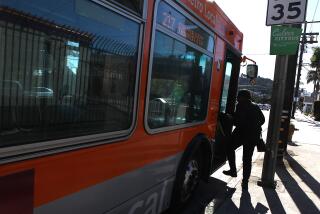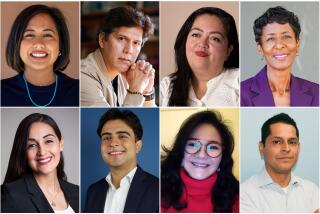Urban Primary Gauges Presidential Campaign : Politics: Non-binding CityVote will pit candidates in 20 cities nationally. Impact may be minimal because it lacks support of contenders.
- Share via
In an age when a pay-to-play straw poll and a national book tour rank as major political events, candidates for the White House are wondering what to make of the latest electoral device: A non-binding “urban primary” this fall.
Called CityVote, it was conceived by former Irvine Mayor Larry Agran and will pit 20 declared or prospective presidential candidates in balloting that coincides with Nov. 7 local elections in 20 cities ranging from Moscow, Ida., to Rochester, N.Y. In California, the only participating city is Pasadena.
The contest could help gauge the potential strength of Gen. Colin L. Powell, who is contemplating a presidential run and will appear on the CityVote ballot. For the most part, however, the major declared presidential candidates are ignoring CityVote, casting its impact in doubt.
The idea behind the contest was to snatch some limelight from February’s Iowa caucuses and New Hampshire primary and, in the process, force White House contenders to focus more on urban problems and less on the concerns of two small states. The Rev. Jesse Jackson, who is also on the CityVote ballot, has enthusiastically endorsed the concept and says he will participate in the three televised candidate forums organizers want to hold later this month.
But CityVote needs more than Jackson, who remains uncommitted about a presidential run. To become a force in the presidential selection process, the effort must attract several of the front-line Republican candidates and perhaps a few of the big-name independents too.
So far, few are even nibbling.
Sen. Arlen Specter (R-Pa.) said he is considering taking part in the first televised forum, scheduled for Friday in Minneapolis-St. Paul. But Senate Majority Leader Bob Dole of Kansas, the GOP front-runner, and most of his rivals have ruled out active participation in the forums or the balloting.
Powell’s office says he is concentrating on his book tour and will not show up either.
In another blow to CityVote, Don Fowler, head of the Democratic National Committee, recently wrote mayors of the participating cities asking that President Clinton’s name be dropped from the ballot.
That effort has generally been rebuffed. In St. Paul, for instance, the City Council responded by voting unanimously to go ahead with the original concept, which calls for a single ballot that includes virtually all active and plausible presidential contenders unless they declare in writing their intention not to run.
Boston and Newark, N.J., meanwhile, face challenges from state and county officials on whether the CityVote balloting will be allowed. A similar dispute has already knocked Baltimore out of CityVote.
The contest’s organizers are undaunted by this host of problems.
Agran said: “These candidates will face a Nov. 7 judgment of the voters, like it or not.”
Agran ran a long-shot campaign for the Democratic presidential nomination in 1992; and that June he won endorsement for a study of the CityVote program from the National Conference of Mayors. CityVote’s $500,000 multiyear budget is funded by a variety of sources, including the Carnegie Corp.
Agran calls the project an important step in improving the presidential selection process.
“I think if CityVote is successful, it will raise anew the question of a national primary or a series of federally structured regional primaries, rather than the haphazard method we have now,” he said.
It is an article of faith with CityVote organizers that voters participating in the contest will punish candidates who do not take part in the process and reward those who have a national urban agenda.
But is there anything for the candidates to fear?
UC Berkeley professor Nelson Polsby, who has studied the electoral process for more than 20 years, calls CityVote a “publicity event” that is unlikely to have any significant effect on the election.
Pasadena City Councilman William E. Thomson said: “I think you are going to have [an event] that no one comes to.” He made his comment at last week’s council meeting, where he expressed skepticism about the city advancing $30,000 to support the balloting, an Oct. 29 forum and a series of related fund-raisers.
Complicating the situation in Pasadena is that CityVote is now alone on the ballot. A scheduled local contest was called off when the community college election went uncontested.
Times correspondent Richard Winton contributed to this story.
More to Read
Get the L.A. Times Politics newsletter
Deeply reported insights into legislation, politics and policy from Sacramento, Washington and beyond. In your inbox twice per week.
You may occasionally receive promotional content from the Los Angeles Times.










